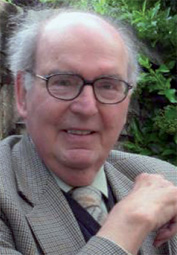John Joubert Connection

John Joubert was born in Cape Town, South Africa, in 1927. After studying composition with W. H. Bell in Cape Town, he came to England in 1946 on a Performing Right Society Scholarship, and studied under Howard Ferguson at the Royal Academy of Music. He entered academic life as a university lecturer, and taught at both Hull and Birmingham Universities, becoming Reader in Music at Birmingham in 1969. Since his retirement from teaching in 1986 he has devoted his time exclusively to composition. His most recent large scale work is a Requiem, to be performed at the 2010 Three Choirs Festival.
The composer writes: This song-cycle was commissioned by the Royal Musical Association as part of its centenary celebrations in 1974. It was designed and written for David Munrow’s Early Music Consort of London, and first performed at Stationers’ Hall in the City of London in the November of that year. The artists taking part were James Bowman (countertenor), David Munrow (recorder), Oliver Brookes (bass viol) and Christopher Hogwood (harpsichord). I later revised the work, both shortening it and allowing for the recorder, bass viol and harpsichord parts to be played on flute, cello, and piano respectively. In this recording the bass viol part is played on cello, but the scoring otherwise remains the same as in the original version. The first performance of the revision was given at Dunham Massey, Cheshire in 1988.
The theme of the cycle is, as the name implies, a comparison between the relative advantages of Youth and Age, usually to the disparagement of the latter. It consists of five settings of sixteenth century verse with the Shakespeare sonnet, which provides the cycle with its title, appearing as its centrepiece. The first song, a lament for the passing of time, is set for the whole ensemble and makes much use of the sighing motif suggested by the words “Ay me” which begin each alternate line of verse, starting with the first. The text of the second song is an admonition to those of riper years not to frown upon those youthful indiscretions which they themselves may have indulged in. The accompaniment is scored for sopranino recorder and takes a more light-hearted view of the cycle’s central theme. The Shakespeare sonnet which follows draws up a comprehensive balance-sheet of the advantages and disadvantages of Youth and Age. This is the only through-composed setting in contrast to the other songs in the cycle, each of which consists of two stanzas only and which are strophically set. Scored for voice and harpsichord the music juxtaposes augmented fourths in double-dotted rhythm to suggest Age, alternating with more lyrical material to convey its opposite. The fourth song is more reflective, its text putting forward the view that Youth cannot have things all its own way, that “embers live when flames do die”, that “buds are soonest nipped with frost”, and that in any case Death awaits all of us, young and old. The cello provides the sole accompaniment here. The fifth and final song again takes up the theme of Time, how it can consume all things save Love which alone has the capacity to endure. The use of the full ensemble to accompany the voice provides another link with the opening song of the cycle, though the mood is decidedly more upbeat. Whatever the relative merits of Youth and Age and despite the ravages of Time, Love is common to all three and will outlast them all. As with the other strophic settings, there are two stanzas, the music of the second being a variant of the first. The material is largely based on the medieval “double leading-note” cadence in which the fourth degree of the scale is sharpened as well as the leading note in the chord immediately preceding the final chord. Scalic melodic passages are combined with this to bring the song - and the cycle - to a positive end.
Guild Music.com
Comments
Post a Comment